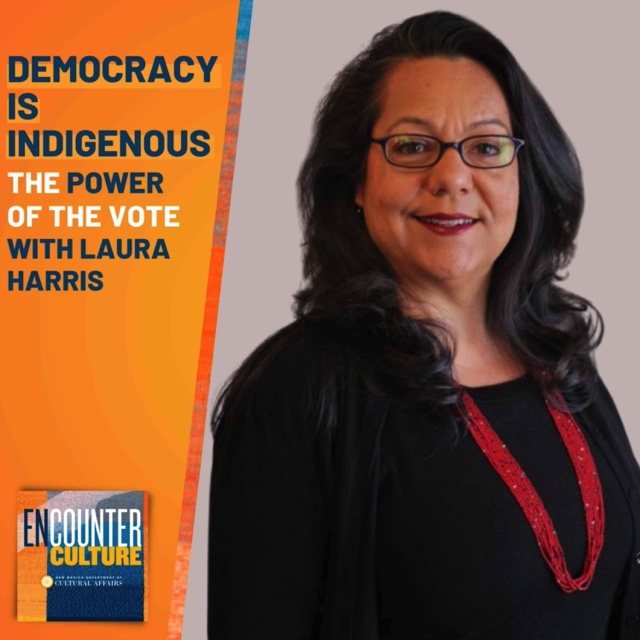When Indigenous people vote, they honor their past and forge a better tomorrow for their communities. The act itself, however, remains a complicated exercise. Indigenous voters must contend with a history of colonial rule, the goal of which was to eradicate their way of life, as well as present-day attempts by self-styled “poll watchers” to block their access to polling places or annul their ballots. And yet, democracy has always been Indigenous; a tribe’s power has always rested with its people.
Welcome to the sixth and final episode in Encounter Culture’s series about the life and legacy of Miguel Trujillo, a collaboration with the New Mexico History Museum. We invite you to revisit previous episodes to learn about Miguel, Indigenous voting rights before and after Trujillo v. Garley, and the people continuing this vital work today.
Encounter Culture host Charlotte Jusinski and series co-host Stephanie Padilla, speak with the esteemed Laura Harris of Comanche Nation. She’s the daughter of LaDonna Harris, the famed Comanche activist and politician, and Fred Harris, the similarly famous senator from Oklahoma who often fought for Native rights.
Laura’s life is steeped in political activism. She has extensive experience in national, state, and local campaigns and in political fundraising. She’s also the executive director of Americans for Indian Opportunity. The trio discusses advocacy, education, and voting as paths to protecting Indigenous self-determination. They also examine threats Indigenous voters face when participating in the electoral process. Then, Charlotte recaps the series with Stephanie and asks her to share some of her personal discoveries.
“The idea of Indigenous democracy is a strong part of our national psyche,” says Laura of tribal life before the colonizers arrived. “Nothing like that existed in Europe at the time.” But it wasn’t until Congress passed the Indian Citizens Act of 1924 that Native Americans were considered eligible to participate in American-style democracy, and another 24 years before Miguel Trujillo won the right to vote for Indigenous folks in New Mexico.
Since then, folks like Laura have dedicated themselves to bolstering Indigenous participation in local and national elections, demonstrating that Native concerns like climate change and equity are American concerns. “It’s hard work,” she admits, adding, “Our worldview is very relevant today.”
This episode was recorded in October 2022. Specific references to campaigning efforts and reported voter suppression tactics are from that election season, but voters continue to face similar challenges.
We’d love to hear from you! What did you think of this season’s collaboration with the New Mexico History Museum about Native American Voting Rights Before and After Trujillo v. Garley? Send feedback to elpalacio@dca.nm.gov. You can write a regular email or record a short voice memo and attach it for us to listen to.
MENTIONED IN THIS EPISODE
Americans for Indian Opportunity
National Urban Indian Family Coalition
QUOTES
Laura Harris (Comanche)
“If we’re going to really address climate change in the United States, we’re gonna have to have a culture change, and we could look at an Indigenous worldview for that culture change.”
“Everyone ought to feel welcome at polling sites.”
“Get involved in a campaign. They are a lot of fun. I’ve been in campaigns since in utero!”
“We have a real stake in voting, both in urban areas and in rural tribal communities because we’re a part of the federal system of government, just like states are tribes or governments, and it really takes good relations and strong tribal sovereignty to maintain that and to maintain our right to vote.”
“When Native Americans reach out to other Native Americans, you get a much warmer welcome, and they’re more willing to listen to you say, ‘I’m a Native American and I’m working for this person because they believe in the same values that I do.’”
“We say, ‘What Congress giveth, Congress can take it the way”––and they have. They’ve restricted our rights here and there, and then they open ’em back up, and then they get restricted again. So it’s in our own best interest to run for office and to vote for candidates that support tribes and urban Natives.”
Visit http://newmexicoculture.org for info about our museums, historic sites, virtual tours, and more.
Encounter Culture, a production of the New Mexico Department of Cultural Affairs, is produced and edited by Andrea Klunder at The Creative Impostor Studios.
Hosted by Stephanie Padilla (Isleta, Laguna, Cochiti) & Charlotte Jusinski, Editor at El Palacio Magazine
Technical Director & Production Audio: Edwin R. Ruiz
Recording Engineer: Kabby at Kabby Sound Studios in Santa Fe
Executive Producer: Daniel Zillmann
Consulting Producer & Editor: Monica Braine (Assiniboine/Lakota)
Associate Producer & Editor: Alex Riegler
Show Notes: Lisa Widder
Social Media Design: Caitlin Sunderland
Theme Music: D’Santi Nava
Instagram: @newmexicanculture
For more, visit podcast.nmculture.org.
Special thank you to Clark Tenakhongva, along with Gary Stroutsos and Matthew Nelson, for the incredible Hopi music featured throughout all 6 episodes of this season. Their new album Hon Muru is set to release in August 2023 and will be available for purchase along with their other recordings on Bandcamp and at ongtupqa.com.
This season was made possible due to the generosity of the National Endowment for the Humanities and the family of Miguel and Ruchanda Trujillo.


